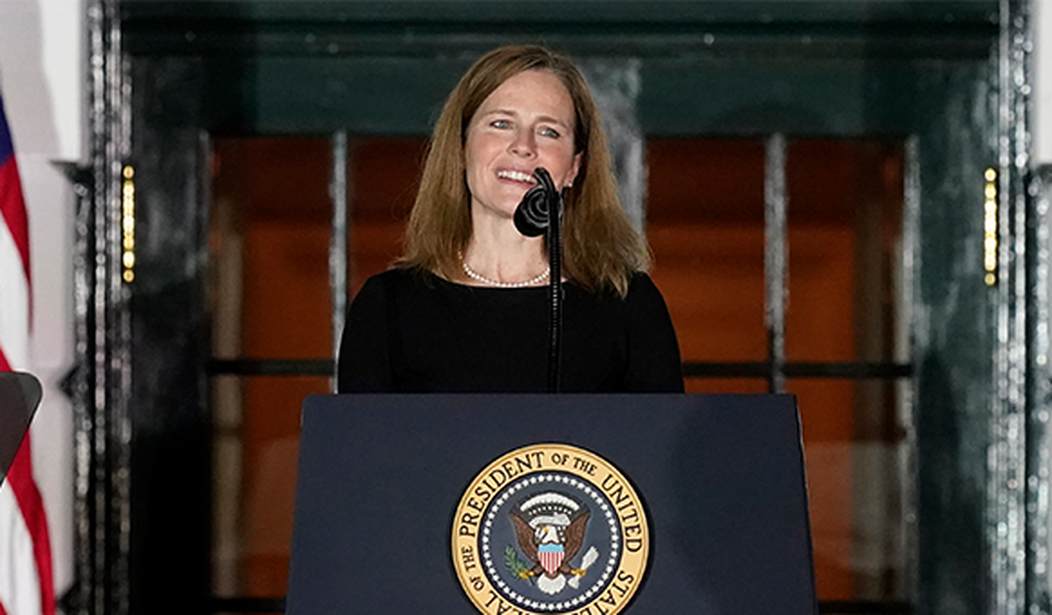Of course not. Those collect more on Pennsylvania Avenue than on 1st Street NE. That’s not to say that Supreme Court justices are immune to politics, nor does Amy Coney Barrett argue otherwise. But the most recent addition to the court takes exception to the notion that politics plays any substantial role in their deliberations:
In the wake of a controversial decision on abortion rights, U.S. Supreme Court Justice Amy Coney Barrett told a crowd of more than 100 here that she doesn’t believe the highest court in the land is politically driven.
“My goal today is to convince you that this court is not comprised of a bunch of partisan hacks,” she told the guests at a Sunday celebration of the 30th anniversary of the opening of the McConnell Center at the University of Louisville. …
“Judicial philosophies are not the same as political parties,” she said, noting that she identifies as an “originalist” and citing fellow Justice Stephen Breyer as an example of the other main school of thought, “pragmatism.”
Barrett cited a number of cases in which the nine justices on the court did not rule along “party lines” — meaning each justice appointed by a Republican voting together and each justice appointed by a Democrat doing the same.
We could also cite a number of cases in which they do, with the Texas abortion law being merely the most recent. Immediately preceding that, however, was the ruling on the CDC’s eviction moratorium, which was just as political. While the majority of cases break down along other lines, enough cases break down in the current 6-3 split between conservatives and liberals to make it plain that politics does have an impact, even if it may not be the primary driving force.
Barrett’s description of “pragmatism” explains this. In essence, Breyer and his two “pragmatist” colleagues engage in outcome-based jurisprudence, not statutory or constitutional law. In fact, we can add John Roberts to that category more often than not, as in the Texas abortion law in which Roberts conceded that the majority was correct on the law but objected to the outcome anyway. The CDC’s eviction moratorium had absolutely no basis in law and should have been tossed unanimously both times. Instead, Breyer and the other two liberals argued for outcomes, while Roberts wisely chose that moment to operate on the basis of constitutional law.
“Pragmatism” is another word for judicial activism — ignoring the law in order to achieve a preferred outcome. Preferred outcomes is the province of legislators, not judges. Originalism and textualism are two different ways to read the law and the Constitution; “pragmatism” is a philosophy for ignoring them to satisfy one’s own sense of justice apart from the law.
That may not line up entirely with partisan interests, but it lines up often enough to note the correlation.
Nevertheless, Barrett insists that people should take the justices at their word, even while disagreeing. They are diligent about keeping out their own biases, she assures the audience:
Justices must be “hyper vigilant to make sure they’re not letting personal biases creep into their decisions, since judges are people, too,” Barrett said at a lecture hosted by the University of Louisville’s McConnell Center. …
“To say the court’s reasoning is flawed is different from saying the court is acting in a partisan manner,” said Barrett, whose confirmation to the seat left open by the death of the liberal Justice Ruth Bader Ginsburg cemented conservative control of the court. “I think we need to evaluate what the court is doing on its own terms.”
Fair enough, but “pragmatism” amplifies the issue of personal biases, even if those aren’t tied to a particular political party. Relying on the law is what eliminates many if not most political biases. Deciding to choose outcomes based on one’s view of the “pragmatic” outcome is by definition biased. It requires a view that the judiciary is the supreme branch, not that this panel is merely supreme over the lower courts. It is this philosophy that has driven the Supreme Court for decades, perhaps longer, and one reason why it has become the political spoils in every election cycle that end up mattering most.
Barrett is certainly correct that he biases and partisan affiliations matter less than the judicial philosophy. Unfortunately so, in fact, and that is true especially if we “evaluate what the court is doing on its own terms.”









Join the conversation as a VIP Member